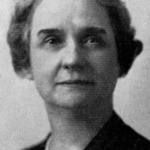Interviewer: Lillian Van Loan
Interview Date: July 12, 1956
Location: Oregon State College, Corvallis, Oregon
Duration: 1:02:19
In this interview Ava B. Milam Clark provides insights into the early days of Oregon Agricultural College, now Oregon State University, and the establishment of its School of Home Economics. Clark, who joined the college in 1911, recounts her experiences as a new professor and discusses the challenges of assuming a leadership role with a new staff. She talks about the guidance she received from OAC President William Jasper Kerr and highlights the pioneering work of Dr. Margaret Snell, who founded the Department of Household Economy and Hygiene at the college in 1889.
The interview then turns to the growth of the School of Home Economics, the evolution of its curriculum, and its impact in Oregon and beyond. Clark emphasizes the school’s commitment to its fundamental objectives, namely educating individuals for homemaking and family life. She discusses the school's distinctive features, most prominently its international program, which was initiated by Clark because of her belief in the importance of broadening students' horizons and teaching about different cultures. Clark then shares her experiences in contributing to home economics education abroad, particularly in China, emphasizing the need for trained national leaders.
Next, Clark discusses her interactions and relationships with her fellow faculty members at Oregon State. Notably, she describes the pioneering venture of hosting a tearoom at the 1915 World's Fair in San Francisco, which marked the introduction of institutional management into the curriculum. The tearoom project not only covered its expenses but also contributed $1,000 to the student loan fund. She also talks about the college’s hosting of the American Home Economics Association meeting in 1922, an event that was a particular source of pride.
The interview concludes with a discussion of Clark’s retirement and subsequent experiences with the United Nations in the Middle East, followed by her marriage to J.C. Clark.
Dublin Core
Title
Description
The interview then turns to the growth of the School of Home Economics, the evolution of its curriculum, and its impact in Oregon and beyond. Clark emphasizes the school’s commitment to its fundamental objectives, namely educating individuals for homemaking and family life. She discusses the school's distinctive features, most prominently its international program, which was initiated by Clark because of her belief in the importance of broadening students' horizons and teaching about different cultures. Clark then shares her experiences in contributing to home economics education abroad, particularly in China, emphasizing the need for trained national leaders.
Next, Clark discusses her interactions and relationships with her fellow faculty members at Oregon State. Notably, she describes the pioneering venture of hosting a tearoom at the 1915 World's Fair in San Francisco, which marked the introduction of institutional management into the curriculum. The tearoom project not only covered its expenses but also contributed $1,000 to the student loan fund. She also talks about the college’s hosting of the American Home Economics Association meeting in 1922, an event that was a particular source of pride.
The interview concludes with a discussion of Clark’s retirement and subsequent experiences with the United Nations in the Middle East, followed by her marriage to J.C. Clark.

